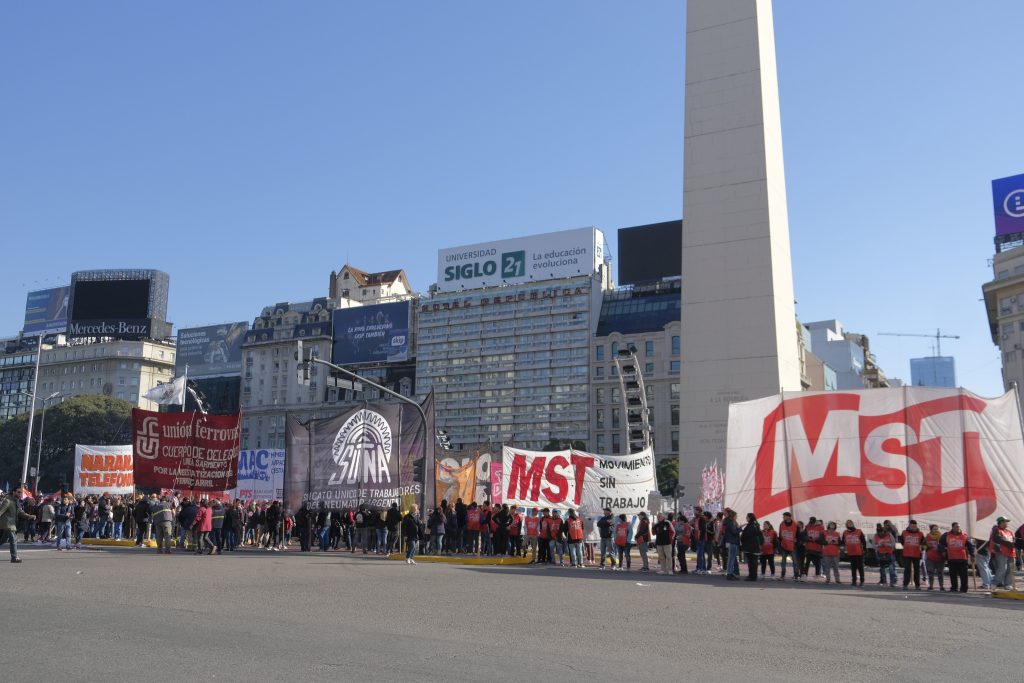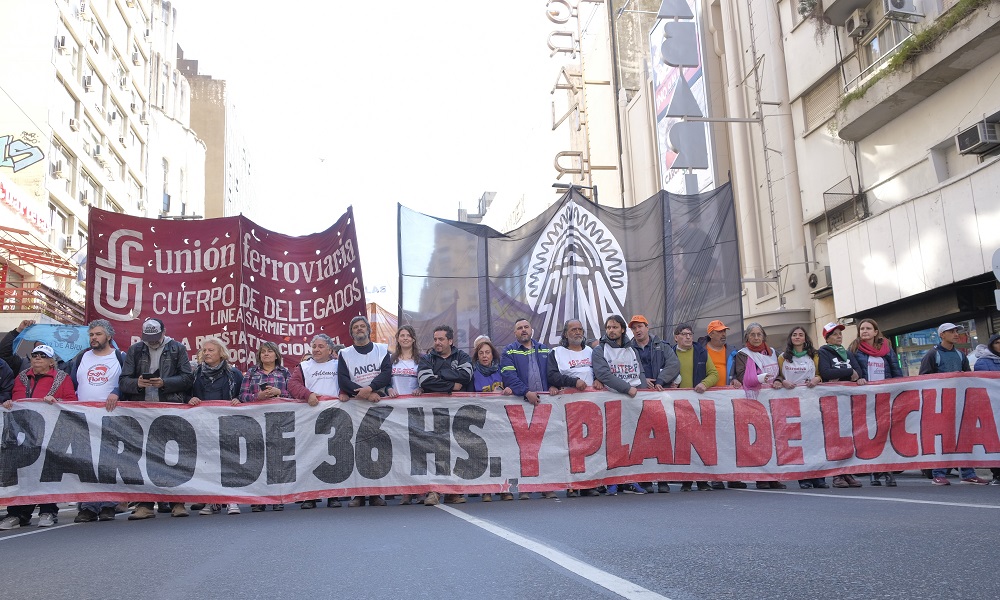Contra la tregua y por una salida anticapitalista
El 22A el sindicalismo combativo y la izquierda ganamos las calles y copamos Plaza de Mayo. Rechazamos la tregua del PJ y la burocracia, y postulamos una salida para que la crisis la paguen los capitalistas. ANCLA y el MST fuimos una de las dos vertientes fundamentales de la movida y en el marco de esta gran unidad planteamos nuestra postura.
El salto en la crisis derivada de la paliza que recibió el gobierno conmovió al país, todavía sorprendido por la magnitud de la derrota macrista. Pero no quedó la menor duda que esta crisis la pagamos los trabajadores y el pueblo. En menos de 24 horas se pulverizaron acuerdos paritarios que costaron semanas de luchas y todos los de abajo salimos más pobres, mientras le financiamos la fiesta a “los mercados”.
No hay dudas de la responsabilidad de las corporaciones, los bancos, el FMI y el gobierno derrotado, al que le soltaron la mano. Con la devaluación marcaron la cancha ante el repudio popular en las PASO, que fue no sólo a un gobierno sino a un proyecto capitalista de ajuste y reformas reaccionarias (como la laboral, que le obligamos a guardar para mejor ocasión).
Dos salidas
Hubo dos maneras de responder frente a tamaño terremoto. La de Alberto Fernández y el Frente de Todos, que convalidaron la devaluación como un adelanto del trabajo sucio. Junto con la burocracia sindical de las centrales llamaron a la calma, a no hacer paros, a sostener a Macri para garantizar una transición ordenada.
Y la del sindicalismo combativo y la izquierda, que plantamos bandera en las calles y en la Plaza, planteando que ni las migajas que tiró Macri para descomprimir ni el silencio y la buena letra de Alberto son salida. Porque ambos proponen seguir bajo el yugo del FMI. Salimos a la calle a postular una salida distinta, de ruptura con el FMI para que la crisis la paguen las corporaciones. Llamamos a romper la tregua cómplice del PJ y la CGT, a preparar y a reclamar un paro nacional y un plan de lucha para imponer esta salida obrera y popular.
La masividad de la marcha del 22, que se replicó en distintas ciudades del país, demostró y canalizó la necesidad de movilizar. Así lo tuvieron que reflejar los grandes medios, que se vieron obligados a hacer un alto en los llamados de oficialistas y “opositores” a no hacer olas para “tranquilizar a los mercados”. En este contexto, hubo algunas polémicas sobre la política y el carácter de la acción que hacía falta convocar.

Algunos debates
En este marco positivo de la masiva movilización se desarrollaron algunos debates importantes con las organizaciones con las que compartimos el FIT-Unidad y dentro del Plenario del sindicalismo combativo. Coincidiendo en el programa de emergencia y en el reclamo de paro general, las demás fuerzas se negaron a agitar la necesidad de que Macri se vaya ya, adelantar las elecciones pero que sean para una Asamblea Constituyente (libre y soberana) para que el pueblo decida. Por posiciones electoralistas (evitar confrontar con la base electoral K como dijo el PTS), o economicistas (como las de PO e IS), el FIT-U, como la única coalición unitaria de la izquierda, estuvo ausente a la hora de exigir que el gobierno repudiado masivamente se vaya de forma anticipada. Y de reclamar una salida democrática para responder a la crisis política que se había abierto.
El otro importante debate que tuvimos se dio respecto del tipo de acción que se necesitaba. Para nosotros era necesaria una gran movilización de carácter político que ponga en escena al FIT-Unidad en primer lugar junto al sindicalismo combativo para aparecer claramente como un polo alternativo frente al acuerdo de gobernabilidad Macri-Fernández. Lamentablemente primó el criterio de realizar una acción que, si bien fue muy importante, tuvo un sesgo predominantemente social sindical y por ello insuficiente para responder en toda su magnitud al carácter político de la crisis y al interrogante que estaba en la cabeza del movimiento de masas.
Nos parece muy equivocado diluir a la izquierda y “esconderla” en un segundo plano, en una acción que no surge de un proceso de masas derivado de un conflicto o un sindicato, sino que es claramente vertebrada alrededor de las agrupaciones sindicales de la izquierda clasista, es decir del activo movilizado en algunos de los gremios donde las fuerzas de izquierda tenemos influencia. Dirigentes del PO y su CSC argumentan que la base de nuestros sindicatos votó mayoritariamente al PJ. Entonces, justamente, no postular a la izquierda junto al sindicalismo combativo es no disputar esos sectores y ganarlos para una salida de clase y anticapitalista. Limitarnos a una postura sindicalista y economicista es renunciar a esa disputa de antemano.
El sindicalismo combativo no puede ser neutral. Debe ser de lucha, dando la pelea hasta el final; debe ser democrático y no reproducir ninguna de las prácticas burocráticas de la vieja dirigencia; debe ser clasista y antipatronal, y debe tener perspectiva de género. Pero también tiene que ser de izquierda, para estar al servicio de la construcción de una alternativa política de los trabajadores para que no se vean obligados a optar por el “mal menor” y seguir enfeudados a las variantes peronistas.
Cómo seguirla
Como lo planteamos desde ANCLA y el MST en el acto de la Plaza y coincidimos con los demás convocantes, la continuidad de estas acciones es vital para estimular la movilización unitaria ahora en la transición y fortalecerla de cara al ajuste que se viene de la mano del próximo gobierno. Llamando o reclamando asambleas, plenarios abiertos y reuniones de activistas, impulsando la exigencia de paro nacional y plan de lucha. Llevando a cada gremio y lugar de trabajo el programa de emergencia obrero y popular. Y fortaleciendo y ampliando el Plenario del Sindicalismo Combativo para avanzar en la mayor unidad del activismo antiburocrático. Y dándole fuerza al FIT-Unidad, la izquierda que se une. En ese camino marchamos el viernes 30 al ex Ministerio de Trabajo para reclamar, en ocasión de la reunión del Consejo del Salario, la implementación del programa de emergencia que venimos levantando.
Guillermo Pacagnini




